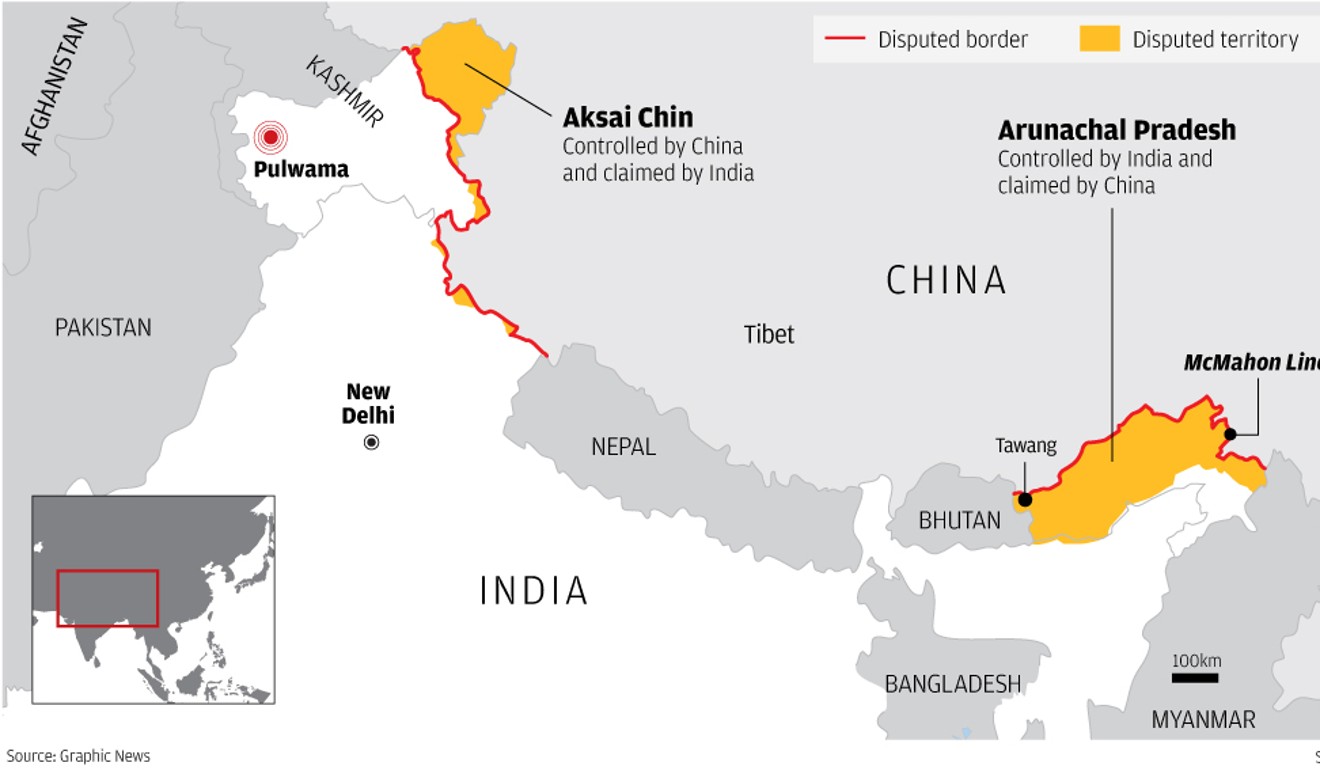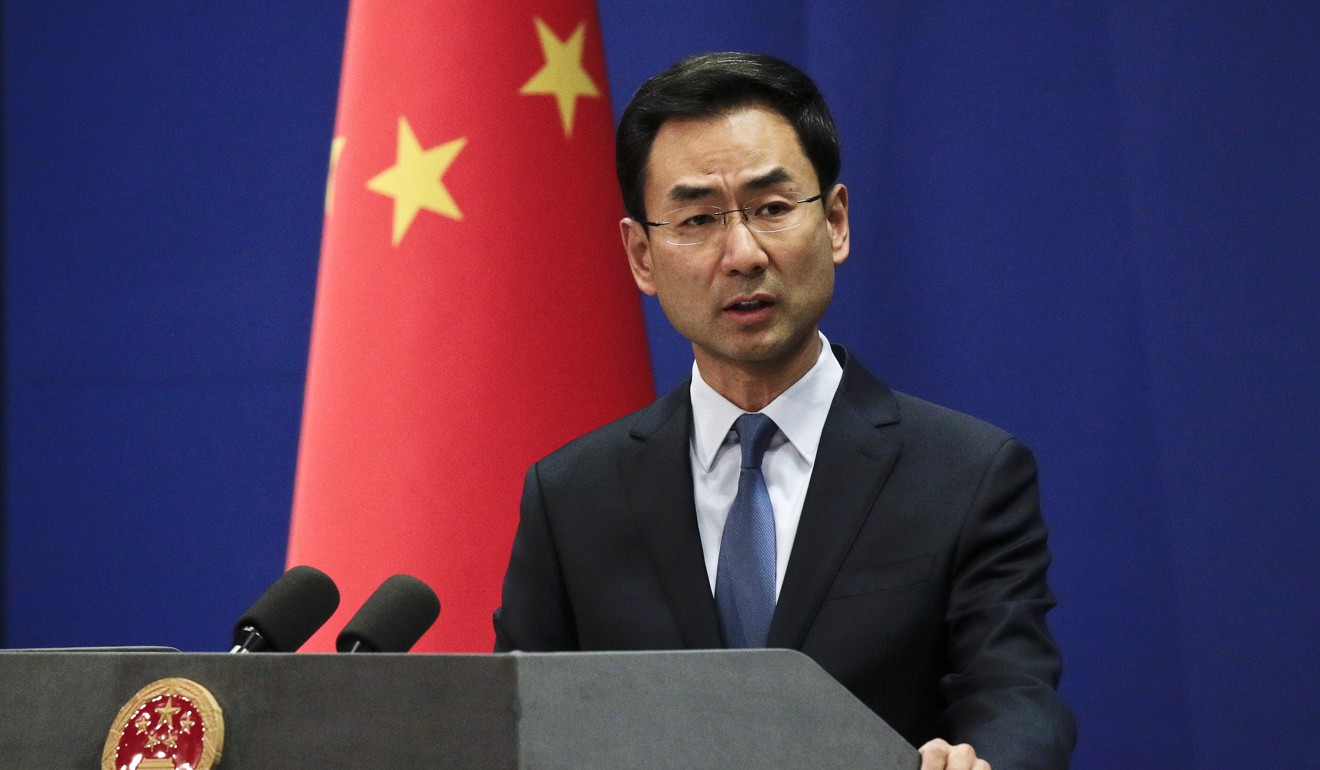
China resists India’s call to have head of Jaish-e-Mohammed labelled a terrorist
- Beijing says UN rules make it impossible to back New Delhi’s appeal but it will ‘continue to handle relevant sanctions issue in a constructive and responsible manner’
- China’s intransigence likely to lead to more mistrust towards Beijing in India, academic says
China has rejected India’s call to have the head of a Pakistan-based militant group put on a United Nations terror list, sparking a fresh row in the aftermath of one of the deadliest attacks on Indian security forces in the restive Kashmir region.
The car bomb attack by the Jaish-e-Mohammed (JeM) terrorist group in India-administered Kashmir has turned the spotlight back on China, which has long refused to have the group’s founder Masood Azhar listed as a terrorist, a position most analysts say Beijing holds out of allegiance to Islamabad, its so-called all-weather ally.
What ‘Wuhan spirit’? Kashmir suicide attack reopens Modi’s China wound
China’s official line is that there is not enough evidence to sanction Azhar under UN rules – there have been calls to do so for at least a decade – even though the JeM has been designated as a terrorist organisation since 2001.
“The 1267 Committee of the Security Council has a clear stipulation on the listing and procedure of terrorist organisations,” Chinese foreign ministry spokesman Geng Shuang said on Friday. “China will continue to handle the relevant sanctions issue in a constructive and responsible manner.”
After the attack in the town of Pulwama on Thursday, which killed at least 44 paramilitary personnel, New Delhi called for the “complete isolation of Pakistan” for its alleged role in the attack, which Islamabad denies. While the Indian government had targeted its rhetoric at Pakistan, there was likely to be mounting mistrust towards Beijing over its blocking of terrorist sanctions, particularly as nationalism came to the fore in India’s upcoming elections, analysts said.
Indian Foreign Secretary Vijay Gokhale told China’s envoy to Delhi Luo Zhaohui after the incident that Azhar must be listed as a global terrorist under UN Security Council Resolution 1267, The Indian Express reported.

“Realpolitik considerations seem to be influencing China’s behaviour,” said Srikanth Kondapalli, a Chinese studies professor at Jawaharlal Nehru University in the Indian capital.
“The ‘all weather’ friendship between China and Pakistan, which involved training [Afghan guerilla fighters] mujahideen during the 80s and arms transfers to Pakistan – all make China complicit in this issue. In terms of impact on India-China relations, China’s intransigence will lead to more mistrust towards Beijing in India.”
China upset as India’s Modi lays foundation stone for new airport in Arunachal Pradesh
This latest flashpoint – Indian Prime Minister Narendra Modi said on Friday that “people’s blood is boiling at what happened” – comes as China and India have sought to reset their relations after a tense, two-month border stand-off at Doklam in 2017. But even as Modi and Chinese President Xi Jinping ushered in friendlier ties with the “Wuhan spirit” of their summit in the central Chinese city last year, blocked terrorist sanctions have remained a sticking point.

Before the Kashmir attack, Jaish-e-Mohammed had been blamed for the deaths of 30 Indian security forces in the 2016 storming of an Indian airbase in Pathankot and the attack on the Indian parliament in 2001. The latter pushed India and Pakistan close to war in the Muslim-majority Kashmir, which is claimed and controlled by both.
Why India’s expanding military ties with US and Russia could put squeeze on China
Wang Dehua, head of the Institute for South and Central Asia Studies at the Shanghai Municipal Centre for International Studies, said China continued to hold the position – it is the only Security Council member that does so – due to India’s lack of evidence about Azhar’s links to designated terrorist groups.
“It is useless to blame China for obstructing,” he said, arguing that Resolution 1267 was drawn up specifically to target individuals with links to al-Qaeda and Islamic State.
“No matter the nature of the JeM, there is no evidence that its leader Azhar is subordinate to al-Qaeda or Islamic State. Therefore, the JeM is not subject to Resolution 1267, which specifically names the two organisations.”
The differing views between China, India and Pakistan over the matter could be resolved only through dialogue, he said.

Zhang Jiadong, an international relations professor at Fudan University in Shanghai and former diplomat at the Chinese embassy in India, said the Kashmir suicide attack had “no direct relationship with China-India relations”, arguing that counterterrorism was an issue that could not be politicised.
“Since Prime Minister Modi came to power, Hindu nationalism in India has been on the rise and the space for minority groups has been suppressed, so dissatisfaction has also risen,” he said.
“This has led to an increase in terrorist violence in the Indian-controlled area of Kashmir. This is the critical background for this problem. From an academic point of view, accusing any particular country based on the current publicly available information is untenable.”
Yashwant Sinha, a former foreign minister of India and outspoken critic of Modi, told the South China Morning Post earlier that “China surely has blood on its hands”.
“In blind pursuit of its policy of friendship with Pakistan at any cost, China has become a partner in all its crimes,” he said.

